In this extract from The Beatles Anthology, Paul McCartney, George Harrison, Ringo Starr and Lennon (through meticulously researched archives) recall with chilling candor how they feared for their lives and how that highly charged US tour was to become the beginning of the end of the band.
John (1966): Christianity will go. It will vanish and shrink. I needn't argue about that. I'm right and I will be proved right. We're more popular than Jesus now. I don't know which will go first - rock 'n' roll or Christianity. Jesus was all right, but his disciples were thick and ordinary. It's them twisting it that ruins it for me.
George (March 1966): Why can't we bring all this out in the open? Why is there all this stuff about blasphemy? If Christianity is as good as they say it is, it should stand up to a bit of discussion.
Paul: John used to know Maureen Cleave of the London Evening Standard quite well. We would gravitate to any journalists who were a little better than the average because we could talk to them. We felt we weren't stupid rock 'n' roll stars. We were interested in other things and were seen as spokesmen for youth. So Maureen Cleave's article with John touched on religion and he started to say something that we'd all felt quite keenly: that the Anglican Church had been going downhill for years. They themselves had been complaining about lack of congregations.
Maureen was interesting and easy to talk to. We all did an in depth interview with her. In his, John happened to be talking about religion because, although we were not religious, it was something we were interested in.
We used to get a number of Catholic priests showing up at our gigs and we would do a lot of debating backstage about things like the Church's wealth relative to world poverty. We would say: "You should have gospel singing, that'll pull them in. You should be more lively, instead of singing hackneyed old hymns. Everyone's heard them and they're not getting off on them anymore."
So we felt quite strongly that the Church should get its act together. It wasn't any sort of demonic, anti-religion point of view that John was trying to express.
If you read the whole article, what he was trying to say was something that we all believed in. But he made the unfortunate mistake of talking very freely because Maureen was someone we knew very well, to whom we would just talk straight from the shoulder.
Was it a mistake? I don't know. In the short term, yes. Maybe not in the long term.
John (in 1980): When the bad news comes they shoot the messenger and they don't listen to the message. Whether it be Christianity, Mohammedanism, Buddhism, Confuscianism, Marxism, Maoism, everything. It's always about the person and never about what they said.
Derek Taylor (press officer): The Maureen Cleave article was first printed in London back in March '66, but it appeared in America just before the American tour in August that year. John's comment about the Beatles being bigger than Christ was turned into a big headline in a teen magazine called Dateboook.
Brian (Epstein) was in North Wales recuperating from Manila, among other things, because it had made him ill and he got the message that the Americans were going bananas about John's comment, which was only one line in a two page spread.
George Martin: It got picked up in America and reported on various radio stations and magnified. A storm of protest hit the Beatles hard: "Who do they think they are, comparing themselves to the Lord?"
Records were burned in public bonfires and banned by radio stations and it reached such a pitch that Brian had to prevail upon John to make a statement and an apology.
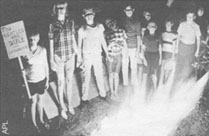 George: The bigger than Jesus quote wasn't really said the way it came out in America, where they took that one thing and blew it out of context. But the repercussions were big, particularly in the Bible Belt. In the South they were having a field day. There's footage of the disc jockey who started all the uproar saying: "Come and bring your Beatle trash and deposit it here. We will have different sites all around the States to deposit this trash and we'll be burning it." And the Ku Klux Klan were saying: "We're going to get them."
George: The bigger than Jesus quote wasn't really said the way it came out in America, where they took that one thing and blew it out of context. But the repercussions were big, particularly in the Bible Belt. In the South they were having a field day. There's footage of the disc jockey who started all the uproar saying: "Come and bring your Beatle trash and deposit it here. We will have different sites all around the States to deposit this trash and we'll be burning it." And the Ku Klux Klan were saying: "We're going to get them."
Neil Aspinall: As the Americans had taken exception to the comment, Brian suggested to John that he record a taped statement explaining what he had meant and regretting all the fuss. Studio time was booked with George Martin, but then there was a change of plan.
Brian went over to the States prior to the tour and made apologies and in press conference told promotors that if they wanted to cancel a show they could do so. Nobody did.
Lennon is deeply interested in religion and was at the time having serious talks with Maureen Cleave, who is both friend of the Beatles and a representative for the London Evening Standard.
What he said and meant, was that he was astonished that in the last 50 years the Church in England and therefore Christ, had suffered a decline in interest. He did not mean to boast about the Beatles' fame. He meant to point out that the Beatles' effect appeared to be, to him, a more immediate one upon certain members of the younger generation.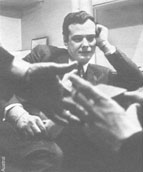 Brian Epstein's Press Statement: The quote which John Lennon made more than three months ago to a London columnist has been quoted and misrepresented entirely out of context.
Brian Epstein's Press Statement: The quote which John Lennon made more than three months ago to a London columnist has been quoted and misrepresented entirely out of context.
Ringo: It was a real mess in America because they took it the wrong way. We read it and it passed us by. It wasn't blasphemous, it was a point of view. If we took it on a worldwide view the Church would still be winning. There weren't more people coming to see us than going to church.
It was a valid point. We were punks and said a few things, but not to cause what it caused. It only did so in America because someone took that one line and shot it to the moon.
John (1974): In England nobody took any notice. They know this guy's babbling off. But over here some lunatic gets his Klan mask on and starts running round burning crosses.
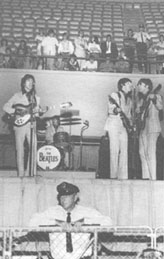 George: Although there was a big palaver, we got to America and held a press conference where John apologised. Under the pressure of the cameras and the press, despite the stress of having to deal with what he'd caused, he gave his apology or explanation. He got through it and we decided, "We'll go and do the gig."
George: Although there was a big palaver, we got to America and held a press conference where John apologised. Under the pressure of the cameras and the press, despite the stress of having to deal with what he'd caused, he gave his apology or explanation. He got through it and we decided, "We'll go and do the gig."
Ringo: We all had to pay for it and it was a scary time. John had to apologise, not because of what he'd said, but to save our lives because there were a lot of very heavy threats, not only to him, but to the whole band. Sometimes you've got to take your cap in your hand and say, "Excuse me."
John (1974): I didn't want to talk because I thought they would kill me. They take things so seriously here. I mean, they shoot you and then they realise that it wasn't that important. So I didn't want to go, but Brian and Paul and the other Beatles persuaded me to come. I was scared stiff.
I saw a couple of press conferences on film where I'm saying, "Well, what I really meant was I wasn't condoning that we were bigger than Jesus. I was just saying the fact that kids follow us and not Jesus." Going through all this hypocrisy and terrified. I was really scared.
Even I doubted how much sense the article meant because I'd forgotten. It was that unimportant. It had been and gone. I had to reread the article to make sure I hadn't said anything I didn't mean.
I said we were more popular than Jesus, which is a fact. I belie ve Jesus was right, Buddha was right and all of those people are right. They're all saying the same thing and I believe it. I believe what Jesus actually said, the basic things he laid down about love and goodness and not what people say he said.
If Jesus being more popular means more control, I don't want that. I'd sooner they all follow us, even if it's just to dance and sing for the rest of their lives. If they took more interest in what Jesus, or any of them said, if they did that, we'd all be there with them.
Ringo: John did not want to apologise becuase he didn't say what they said. But what was happening around us was getting too violent and so Brian asked him and kept asking him to say something. In the end, John realised that he would have to go out and do it.
John (1969): I don't need to go to church. I respect churches because of the sacredness that has been put on them over the years by people who do believe. But I think a lot of bad things have happened in the name of the Church and in the name of Christ. Therefore, I stay away from church and, as Donovan once said, I go to my own church in my own temple once a day.
I think people who need a church should go. The others who know the church is in your own head should visit that temple because that's where the source is. We're all God. Christ said, "The Kingdom of Heaven is within you." And the Indians say that and the Zen people say that. We're all God.
I'm not a god or the God, but we're all God and we're all potentially divine and potentially evil. We all have everything within us and the Kingdom of Heaven is nigh and within us and if you look hard enough you'll see it.
Paul: We all discussed it. We knew it wasn't really a big issue for us, but because it had become so big we couldn't deny it.
I've never seen John so nervous. He realised the full import of what had happened. So he has to say, "I didn't mean it like that. I meant I'm actually quite supportive", which people were able to accept as an answer in the Bible Belt.
I'm not anti-God, anti-Christ or anti-religion. I was not knocking it. I was not saying we are greater or better.
I think it's a bit silly. If they don't like us, why don't they just not buy the records?
It was part of an in-depth series she was doing and so I wasn't really thinking in terms of PR or translating what I was saying. It was going on for a couple of hours and I said it just to cover the subject. It's so complicated and it got out of hand.
When I first heard about the repercussions I thought, "It can't be true, it's just one of those things." And then when I realised it was serious, I was worried stiff because I knew how it would go on and the things that would get said about it and all those miserable pictures of me looking like a cynic. It would go on and on and on and get out of hand and I couldn't control it. I can't answer for it when it gets that big because it's nothing to do with me then.
I'm sorry I said it for the mess it has made, but I never meant it as an anti-religious thing.
My views are from what I've read or observed of Christianity and what it was and what it has been and what it could be.
I'm not knocking it or saying it's bad. I'm just saying it seems to be shrinking and losing context. Nothing seems to be replacing it. It's no good going on and saying, "Yes, it's all fine, we're all Christians and we're all doing this" and we're not doing it.
I don't profess to be a practising Christian. I think Christ was what he was and if anyone says anything great about him, I believe, but I'm not a practising Christian like I was brought up to be.
I got away with it in England in as much as nobody took offence and saw through me, but in America it went the other way. We forget we're Beatles sometimes, you can't help it and if you say something like, "Britain's becoming a police state", you say it exactly the same as two friends in a pub across the bar.
I don't like supposing that somebody like Jesus was alive now and pretending and imagining what he would do. But if he was Jesus and he held that he was the real Jesus that had the same views as before, well, "Eleanor Rigby" wouldn't mean that much to him.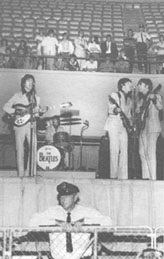 John (Chicago press conference, 11 August, 1966): If I'd said, "Television is more popular than Jesus", I might have got away with it. I am sorry I opened my mouth. I just happened to be talking to a friend and I used the word Beatles as a remote thing: Beatles, like other people see us. I said they are having more influence on kids and things than anything else, including Jesus. I said it in that way, which was the wrong way.
John (Chicago press conference, 11 August, 1966): If I'd said, "Television is more popular than Jesus", I might have got away with it. I am sorry I opened my mouth. I just happened to be talking to a friend and I used the word Beatles as a remote thing: Beatles, like other people see us. I said they are having more influence on kids and things than anything else, including Jesus. I said it in that way, which was the wrong way.
Paul (1966): We don't care about those who don't like us because of the statement. We would rather perform for the people who do like us. We found out that the guy who started it did it purely as an unashamed publicity stunt.
But we knew it was getting pretty rough. The repercussions were that we played a lot of places where people were getting really angry.
The Ku Klux Klan were out in force, which was pretty frightening. There was always that edge in America, we knew that they did have guns. I don't think we contemplated cancelling the tour. We never cancelled anything. But it was starting to get too much. It was building up to us saying, "This is it."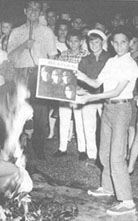 Ringo: It shows us where people are at because they love you and love you, but then when something like that happens millions of kids start burning their Beatles records. There were bonfires of them which was OK for us becuase later they rebought them.
Ringo: It shows us where people are at because they love you and love you, but then when something like that happens millions of kids start burning their Beatles records. There were bonfires of them which was OK for us becuase later they rebought them.
George: With the stress and all the things we had to go through anyway, it was something we could have done without. There was a consideration that we might not bother with the tour because we felt we were going to get threatened.
We thought we could actually pull out of one concert in the South, in Memphis. In Memphis there was film of a guy from the Ku Klux Klan with his shades on, saying, "We have ways of dealing with this." But apparently the members of the Klan who were outside the stadium got chased away by the fans. So although we were feeling quite frightened (I remember sitting in a little minibus on the way to the gig, feeling a bit scared) we did the show.
Nothing happened. We got out there and that was it.
Paul: By the time we got to the Bible Belt, down South, there were people banging on our windows. I particularly remember a young boy, maybe 11 or 12 years old, banging on the window of our coach. If he could have got us, I think he would have killed us. He was fired up with the spirit of the Lord. And we were saying, "No, we love you. It's OK."
It made us wonder about touring. It was a case of how much of a good thing can you have? How long can you sustain things? Every tour had gone great, marvellous, but we were becoming a bit fed up anyway because we'd been at it so long and it gets gruelling: one Holiday Inn after another. Now other things were starting to happen: Manilla, threats and people thinking we were anti-Christ.
George: If everybody who had a gun just shot themselves there wouldn't be a problem.
Paul: Threats were hard for us to comprehend. We weren't into prejudice. We were always very keen on mixed race audiences.
I remember a woman coming to our school once, giving a lecture on South Africa, saying: "It's marvellous you can get a boy to do the tea and we have boys cleaning up and boys in the cricket nets."
We said: "Don't you feel a little embarrassed? It's like slaves, isn't it?"
"No, no, no. They love it, the little boys."
George: I think we were offered gigs in South Africa but we wouldn't go and because of that they banned our records there.
John (1968): Musicians don't usually have this thing about what street you live on. They get that scene sorted out as soon as they meet other musicians. It's the music that counts. But there's no common denominator for society like in music.
Paul: With that being our attitude, shared by all the group, we never wanted to play South Africa or any places where blacks would be separated.
People said to us later that even if you let everybody in, all the black people tended to stick together and all the white people. You don't integrate just because someone says it's nice, you sit with your mates. That was all right, but we didn't want any segregation. We were very keen on people's rights. It wasn't out of any goody-goody thing, we just thought: "Why should you separate black people from white? That's stupid, isn't it?"
John (1966): We dare not go out on the streets. We just stay in the hotel room until the car or caoch calls to take us to the show. We miss an awful lot, but I suppose we will see it one day.
We seem to have gone back (to America) every August, as far as I can see. Like our annual trip. The longest tour we ever do is three weeks and it's usually America where we do the longest tours. Three weeks if you're busy. It's all over before you know what has happened and you're back home.
Neil Aspinall: The American tour was a repetition of what they'd done the year before and, therefore, it was boring, really. It was the same good old exciting America, but it's like anything else if you've done it once or twice. The third time is a bit old hat.
When they plaed Shea Stadium (New York) again, for me it blended in with the first one, though it was said there were slightly fewer people there than the year before.
For some reason I missed the police van that was taking us. I had gone back for something and before I could get in the van, they slammed the doors and off it went. I was left at the hotel so I got a cab, but that broke down in Harlem. Another cab took me to the stadium, but there were thousands of people and I thought: "Oh God, they're really going to let me in. I'm going to just knock on the door and say, 'I'm with the Beatles'."
Then I saw the four of them hanging out of a window and they saw me wandering round the car park. It was like magic, they were shouting: "There he is! Let him in!"
In the Washington gig there had been a Ku Klux Klan demonstration, but it turned out to be six guys in white sheets and conical hats walking round with a placard. It really didn't amount to much. But the assassination threats in Memphis were more scary.
John (1974): One night on a show in the South somewhere (Memphis) somebody let off a fire cracker while we were on stage. There had been threats to shoot us, the Klan were burning Beatles records outside and a lot of the crew-cut kids were joining in with them. Somebody let off a fire cracker and every one of us, I think it's on film, look at each other, because each thought it was the other that had been shot. It was that bad.
George: Cincinnati was an open air venue and they had a bandstand in the centre of the ballpark with a canvas top on it. It was really bad weather, pouring with rain and when Mal got there to set up the equipment he said: "Where's the electricity power feed?" And the fella said: "What do you mean, electricty? I thought they played guitars." He didn't even know we played electric guitars.
It was so wet that we couldn't play. They'd brought in the electricty, but the stage was soaking and we would have been electrocuted, so we cancelled - the only gig we ever missed. But we did it the next morning. We had to get up early and get on and play the concert at midday, then take all the gear apart and go to the airport, fly to St Louis, set up and play the gig originally planned for that day.
In those days all we had were three amps, three guitars and a set of drums. Imagine trying to do it now!
Mal Evans: Open air concerts in the States were terrible. When it looked like rain in the open air I used to be scared stiff. Rain on the wires and everybody would have been blown up. Yet if they'd stopped the show, the kids would have stampeded.
Paul: When we played one place it rained quite heavily and they put bits of corrugated iron over the stage, so it felt like the worst little gig we'd ever played at even before we'd started as a band.
We were having to worry about the rain getting in the amps and this took us right back to the Cavern days. It was worse than those early days and I don't even think the house was full.
After the gig I remember us getting in a big, empty, steel lined wagon, like a removal van. There was no furniture in there, nothing. We were sliding around trying to hold on to something and at that moment everyone said: "Oh, this bloody touring lark, I've had it up to here, man."
I finally agreed. I'd been trying to say: "Ah, touring's good and it keeps us sharp. We need touring and musicians need to play. Keep music live." I had held on to that attitude when there were doubts, but finally I agreed with them.
George and John were the ones most against touring. They got particularly fed up.
So we agreed to say nothing, but never to tour again. We thought we would get into recording and say nothing. We wouldn't make the Big Announcement, but it would gradually dawn on people: "They don't appear to be going on tour, do they? How long was that? Ten years? Maybe they've given it up."
We'd always tried to keep some fun in it for ourselves. In anything you do, you have to do that and we'd been pretty good at it. But now even America was beginning to pall because of the conditions of touring and because we'd done it so many times.
Ringo: In 1966 the road was getting pretty boring and it was also coming to the end for me.
Nobody was listening at the shows. That was OK at the beginning, but it got that we were playing really bad and the reason I joined the Beatles was because they were the best band in Liverpool.
I always wanted to play with good players. That was what it was all about. First and foremost, we were musicians: singers, writers, performers. Where we ended up on a huge crazy pedestal was not really in my plan. My plan was to keep playing great music. But it was obvious to us that the touring had to end soon, because it wasn't working any more.
On the last tour of America the most exciting thing was meeting people who came to the shows, not the shows themselves. We'd played the stadiums, we'd played the big crowds and still we were only doing our 30 minute show.
John (1971): The Beatles were famous for doing 15 minute shows. We could speed it up to 15 minutes over in America. Fifty thousand people and we'd be off. That was our record.
We got our kicks from seeing how fast we could do the whole show. If we were really counting them in too fast, or were too speedy to deal with it, we'd run off and realise we'd only been on 15 minutes.
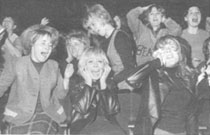 There were times when your voice was so bad (through losing your voice) you virtually wouldn't be singing at all and nobody would notice because there'd be so much noise going on. We could never hear what we were doing. It would just become a sort of happening, like Shea Stadium was a happening. You couldn't hear any music at all. That got boring. That's why we stopped.
There were times when your voice was so bad (through losing your voice) you virtually wouldn't be singing at all and nobody would notice because there'd be so much noise going on. We could never hear what we were doing. It would just become a sort of happening, like Shea Stadium was a happening. You couldn't hear any music at all. That got boring. That's why we stopped.
Paul: By Candlestick Park (San Francisco) it was like: "Don't tell anyone, but this is probably our last gig."
Ringo: There was big talk at Candlestick Park that this had got to end. At that San Francisco gig it seemed that this could possibly be the last time, but I never felt 100 per cent certain till we got back to London. John wanted to give up more than the others. He said that he'd had enough.
John (1980): I didn't want to tour again, especially after having been accused of crucifying Jesus when all I'd made was a flippant remark and having to stand with the Klan outside and fire crackers going on inside. I couldn't take any more.
Ringo: I don't think anyone didn't want to stop touring, Paul would have gone on longer than George and I.
I was feeling such a bad musician and I was fed up playing the way I was playing. That was my criteria for ending it. It just wasn't working on the road any more because I couldn't play.
I don't think any of the decisions were made quickly. We all expressed them and moaned about them, laughed about them and cried about them. Then it had got to a head where it was yes or no time. We seemed to do that with the touring, with the recording and with the breaking up. None of those things ended with someone turning round and saying it without talking about it first.
George: When we got to Candlestick Park we placed our cameras on the amplifiers and put them on the timer. We stopped between tunes, Ringo got down off the drums and we stood facing the amplifiers with our back to the audience and took photographs. We knew. This is it. We're not going to do this again. This is the last concert. It was a unanimous decision.
It was too much, with all those riots and hurricanes. Beatlemania took its toll. We were no longer on the buzz of fame and success. We'd done about 1,400 live shows and I certainly felt that was it. I never really projected into the future. I was thinking, "This is going to be such a relief not to have to go through that madness any more."
It was nice to be popular, but when you saw the size of it, it was rediculous. It felt dangerous because everybody was out of hand and out of line. Even the cops were out of line. They were all caught up in the mania. It was as if they were all in a big movie and we were the ones trapped in the middle of it. It was a very strange feeling.
For a year or so I'd been saying, "Let's not do this anymore." I don't know exactly where in '66 but obviously after the Philipines we thought, "Hey, we've got to pack this in."
We were all still pretty friendly - we were just tired. It had been four years of legging around in a screaming mania. We'd had a couple of small vacations, but we'd only had one big holiday during that whole four years. We needed a rest. I don't think anybody was regretting it, thinking, "This is the end of an era." I think we welcomed it.
John (1966): I reckon we could send out four wax dummies of ourselves and that would satisfy the crowds. Beatles concerts are nothing to do with music any more. They're just bloody tribal rites.
George: While everybody was going mad, we were actually the sanest people in the whole thing.
Neil Aspinall: It was in India that I heard for the first time that they might not tour in 1967. We were all in a hotel suite with Brian talking about going to America. It was George who asked Brian, "Is this touring becoming an annual event?" becuase he wasn't prepared to do it again.
Proabably they'd all spoken about it among themselves and decided then and there that they weren't going to do America the next year.
So when we got to Candlestick Park we knew that was the last gig. For me that wasn't the Last Gig Ever; it was just that they weren't going to tour for a while. I never knew what my role was, so I figured their not touring wouldn't affect me.
With no more live shows planned, the idea was that they could make more records. All the Beatles albums, with the possible exception of Revolver, had been fitted in between coming off the road and getting back on. They would have to make an album in two or three weeks, including the cover and everything. Then they were back on the road with no real time to concentrate on it.
George Martin: Curiously enough the second Shea Stadium concert had 11,000 seats unsold so it was a pretty unsettling time. It was against this background that they said: "Right, we won't do any more. We are going to have a break and then we are going into the studio to make a record."
Paul: I don't remember having a negative feeling about the band. I did about touring. But you always forget the bad bits. It's like a holiday when it rains all the time, you just remember the fine days.
George has said: "We weren't musicians any more, we were just mop tops and rag dolls." I think that was true. We were getting fed up with that aspect, but I think I could have handled it.
But the quality of the music wasn't good and it wasn't getting any better with the touring. We all agreed that maybe going into recording would be the new thing to turn us all on.
John (1966): We are not goody-goody boys. We are not possessed of limitless patience. One has to have the quality of an angel to cheerfully submit to the demands of some fans. We're not trying to pass off as kids and we're human as the next fellow. Whether we look our age or not, very often we feel a lot older than we really are.
We can't go on holding hands forever. We have been Beatles as best we ever will be - those four jolly lads. But we're not those people any more. We are old men. We can't go on hopping on Top Of The Pops forever. We still enjoy it, but sometimes we feel silly. We can't develop the singing because none of us can sing in tune. We've got to find something else to do. Paul says it's like leaving school and finding a job. It's just like school, actually, because you have the group to lean on and then suddenly you find you're on your own.
I shouldn't worry if I was rejected by the public. What I have done is fine, but now I have to do something else.
We sort of half hope for the Downfall, a nice downfall. Then we would just be a pleasant old memory.
Ringo: For Brian Epstein, our not touring sure left a void because part of his gig was to get us out there. That was a huge management thing for him. That's when he was Big Bri, on the road. Once we hit all those towns, it was Mr Epstein, the Beatles' manager.
I think Brian (like the rest of us) was getting tired of doing the same old thing. What fun could it have been for him to rebook us at Candlestick Park or Shea Stadium?
After deciding not to tour I don't think we cared a damn. We'd been having more fun in the studio, as you can hear from Revolver and Rubber Soul. As it was building up, it was getting more experimental. We were starting to spend more time there and the songs were getting better and more interesting. Instead of being pulled out of the studio to go on the road, we could now spend time there and relax.
John (1967): We've had enough of performing forever. I can't imagine any reason which would make us do any sort of tour again. We're all really tired. It does nothing for us any more which is really unfair to the fans, we know, but we've got to think of ourselves.
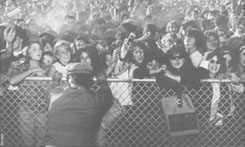 John (1964): I'm just sorry for the people that can't see us live. Sometimes you haven't missed anything because you wouldn't have heard us, but sometimes I think you might have enjoyed it. When we were away from it for a while, it was like the school holidays. You hadn't done any work for a bit and you'd just remember the laughs. You'd look forward to it again. Until you got back and were fed up.
John (1964): I'm just sorry for the people that can't see us live. Sometimes you haven't missed anything because you wouldn't have heard us, but sometimes I think you might have enjoyed it. When we were away from it for a while, it was like the school holidays. You hadn't done any work for a bit and you'd just remember the laughs. You'd look forward to it again. Until you got back and were fed up.
John (1967): It's like the army. One big sameness which you have to go through. One big mass. I can't remember any tours.
John (1969): The music wasn't being heard. It was just a sort of a freak show. The Beatles were the show and the music had nothing to do with it.